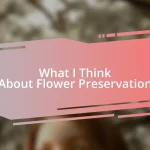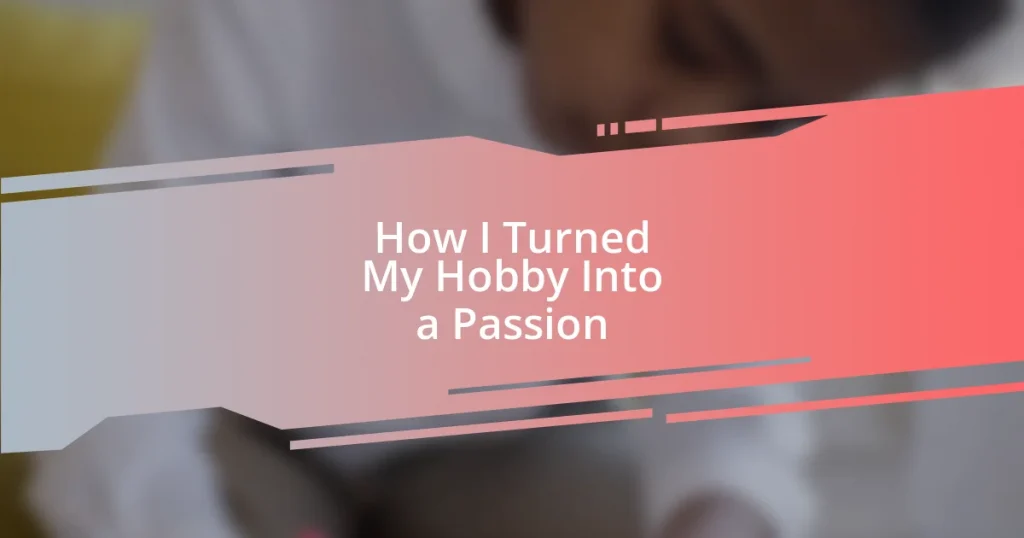Key takeaways:
- Introspection and revisiting childhood interests can help identify your true hobby.
- Setting clear goals and regularly reviewing them enhances your hobby experience and progression.
- Monetizing your hobby is achievable through online platforms, social media, and teaching, by understanding and valuing your work.

Identifying Your True Hobby
Identifying your true hobby often begins with introspection. I remember wondering why I spent countless weekends absorbed in a particular activity while other interests felt like obligations. I asked myself, “What truly ignites my spirit?” This reflection was pivotal in distinguishing mere pastimes from genuine passions.
It’s fascinating how some activities resonate deeply with us while others quickly fade. I once dabbled in painting and enjoyed it, but the moment I picked up a guitar, I felt an electric connection. Have you ever felt that spark when engaging in something? That’s often a sign you’ve stumbled upon your true hobby.
Finally, don’t overlook your childhood interests. I was always fascinated by building things but lost that curiosity for years. Revisiting that simple joy led me to woodworking, which has since transformed into a rewarding escape. What nostalgic pursuits could you explore again? Embracing those forgotten joys might reveal the hobby you’ve been searching for all along.

Setting Goals for Your Hobby
Setting goals for your hobby is crucial if you want to elevate it from a simple pastime to a fulfilling passion. When I began honing my skill in photography, I realized that without clear objectives, I was merely snapping pictures without any real direction. I decided to set both short-term and long-term goals, which added a layer of excitement and purpose to my practice.
Here are some suggestions to help you set effective goals for your hobby:
- Define what success looks like for you. Whether it’s mastering a technique or completing a project, know your target.
- Break larger goals into smaller, achievable steps. This can prevent feeling overwhelmed and keeps you motivated.
- Set deadlines for your goals. A time frame can ignite a sense of urgency and commitment.
- Regularly review and adjust your goals. I often revisit my objectives to ensure they align with my evolving interests and skills.
- Celebrate your progress. Acknowledging small milestones can encourage you and enhance your enjoyment of the hobby.
In my journey to improve my photography skills, I surprised myself by aiming not just to take better photos, but also to share my work online. I feared judgment at first, but embracing that vulnerability became a goal in itself. It pushed me outside my comfort zone, allowing me to connect with fellow enthusiasts and enhancing my passion for the craft. What goals will spark your own journey?

Monetizing Your Hobby Efficiently
Monetizing your hobby doesn’t have to feel like a daunting task. I remember when I first started crafting handmade jewelry; what began as a creative outlet quickly evolved into a business once I realized I could sell my pieces online. The shift happened when I explored platforms like Etsy, where my designs resonated with others. Have you thought about where your hobby might fit into the marketplace?
Understanding your value is essential in this journey. When I first priced my jewelry, I underestimated my work and the effort behind it. After some research, I adjusted my pricing strategy to reflect not only the materials used but also the time and love I poured into each creation. It’s essential to find that balance, don’t you think?
Another practical step is to leverage social media as a marketing tool. I started sharing my creations on Instagram, connecting with a community that appreciated handmade goods. Over time, this engagement led to commissions and collaborations. It felt rewarding to see my hobby transformed into a source of income, all while doing what I love. What platforms can you utilize to showcase your passion?
| Approach | Description |
|---|---|
| Online Marketplaces | Platforms like Etsy or eBay enable hobbyists to list and sell items directly to consumers. |
| Social Media | Using social platforms for showcasing work can significantly boost visibility and customer engagement. |
| Workshops and Classes | Offering classes related to your hobby can turn your skills into a profitable venture. |

Sustaining Long-Term Passion and Growth
Sustaining long-term passion in any hobby requires an unwavering commitment to growth and exploration. I found that continuously challenging myself was key. For instance, after a couple of years in photography, I enrolled in advanced courses that pushed my creative boundaries. It was during these classes that I discovered new techniques, reigniting that initial spark of excitement. Have you ever felt that rush after mastering something new?
Building a community around your passion can also be incredibly uplifting. I remember joining a local photography club where members shared their work and experiences openly. It wasn’t just about learning; it was about forming friendships with those who understood my journey. This connection made me feel accountable, enriching my passion further. How supportive is your current circle in nurturing your hobby?
Lastly, embracing change is crucial for sustained enthusiasm. I’ve shifted from just capturing landscapes to exploring portrait photography because I wanted to tell deeper stories through my lens. This evolution not only kept my work fresh but also broadened my perspective. It’s invigorating, isn’t it, to adapt and grow? So, what new direction will you explore next in your own passion pursuit?















